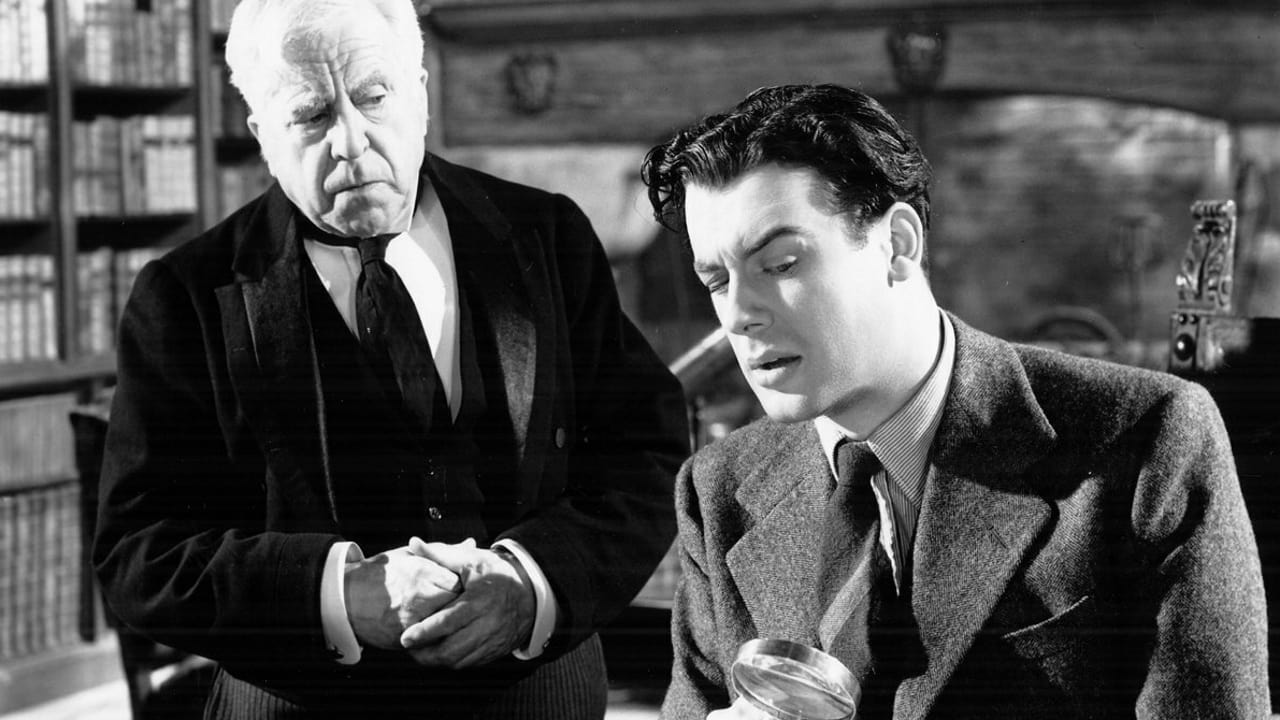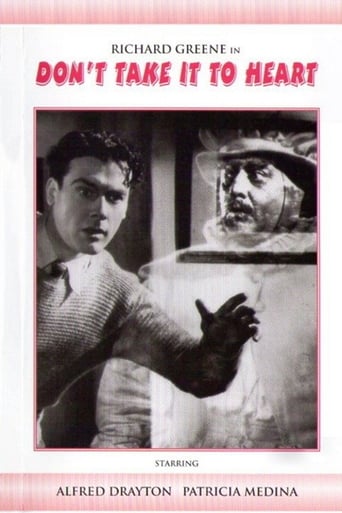



I like movies that are aware of what they are selling... without [any] greater aspirations than to make people laugh and that's it.
View MoreThe best films of this genre always show a path and provide a takeaway for being a better person.
View MoreExcellent and certainly provocative... If nothing else, the film is a real conversation starter.
View MoreIt is encouraging that the film ends so strongly.Otherwise, it wouldn't have been a particularly memorable film
View MoreDon't Take It To Heart! is a most enjoyable outing. Greene is pleasant enough as the hero, Patricia Medina (using her charming natural voice instead of that mid-Atlantic accent she adopted for her Hollywood films) makes a spirited heroine. But the real joys of the film lie in that wonderful gallery of British eccentrics that participate in the main plot and help prop up the secondary romance. Some of my favorites are Claude Dampier as an obliging cretin, Edward Rigby as a gladly ill-used servant who has the film's keynote speech and trips a shuffling fantastic through endless halls to answer the telephone, Moore Marriott who is more subdued than his usual totally irascible but gladly plays up to the not overbright Loopy, Alfred Drayton as the rights-conscious Pike, Ronald Squire as a typically imbecilic figure of the landed gentry who mistakes "Auld Lang Syne" for the national anthem, Harry Fowler who is so young here but just as cheeky, and of course Brefni O'Rorke who can dance such a treat when the credits are down.Expectedly, Dell's direction is as imaginative as his script is sprightly. In the opening scenes it seems as if the camera is almost constantly on the move. The special effects are likewise faultless. And the sets, doubtless made over from a real castle, are as impressively vast as picturesque. Eric Cross, later to work with Dell on The Dark Man, provides his usual superlative camerawork.
View MoreWhen a German bomb lands on a crypt, the explosion lets out the ghost of a bad old earl, and lets loose a roundabout plot involving a decayed aristocrat, his tenant, who wishes to enclose a cricket pitch annoying the local villagers, Richard Greene, who has shown up to look at some recently revealed old manuscripts and his real life wife, Patricia Medina, as the earl's daughter.There's a fair amount of well-constructed social satire in this production, as well as some good jokes, and the amount of silliness increases at a steady pace throughout, as the ghost becomes more and more active in setting things right. A goodly number of screen comics get a chance to amuse the audience, particularly Edward Rigby as the butler, Moore Marriott as the inevitable ciderhouse layabout and Joan Hickson, when she was merely middle-aged -- doubtless, if she ever appeared in any movies when she was young, they were produced by Robert W. Paul.Although the movie becomes a bit too cartoonish for my taste at the three-quarters mark, it recovers itself nicely at the end and makes its points, humorous, dramatic and serious, nicely by the end.
View MorePeter Hayward (Richard Greene) leads the villagers in the town of Chaunduyt (pronounced "Condwit") against a landowner, Mr Pike (Alfred Drayton), who refuses to allow animals onto his land and wants to plough up the cricket pitch. Peter is helped by a ghost (Richard Bird) who has been released from the walls of a stately home after it has been hit by a German bomb. Hey, it might be a British bomb, after all, we now know that in every war it seems traditional to kill your own troops in some way. The film climaxes with a court scene and a surprise revelation.I was hoping for a good ghost story but it is far from that. Unfortunately, this is another example of British silliness. The ghost as played by Richard Bird is hardly in the film and when he does appear, he is portrayed as a friendly buffoon. Another buffoon who I suspect was meant to court sympathy was the "Butler" as portrayed by Edward Rigby. We have tedious sections at the beginning of the film where every time he moves around the stately home, he is accompanied by comedy music. I found him irritating. There are some funny touches, eg, the fact that everyone in the village has the same name due to inbreeding throughout the years (a hot topic especially with the royal family) and this film gives us the original dilemma over the pronunciation of the surname "Bucket"...... or is that "Bouquet"? If you like silly British nonsense, then you will enjoy this film. It's not a catastrophe but it is a disappointment.
View MoreThis picture deserves more publicity. It is a charming British comedy with a great sense of goofiness that the Brits used to do so well.In it, our hero Richard Greene displays the wonderful charm we remember so well from his subsequent "Robin Hood" TV series. As the reluctant Lord (who secretly yearns for commoner vices), Brefni O'Rorke is delightfully wise, subtle, and droll. Even Ivor Barnard, in his brief cameo, is memorable as a French refugee bus driver. (Apparently, he apprenticed in a Parisian taxi.) And scattered throughout the film are many funny bits (such as rival lawyers continually attempting to one-up each other with earlier and more obscure citations.) Indeed, my only disappointment was over the ghost's role. More could have been done with him. Since sheep have a crucial role in the picture, for example, perhaps, as a sight gag, a ghostly encounter might have turned some black ones white. Also, the ghost's fate should somehow have been intertwined with that of the obnoxious plaintiff, who, after the trial, just seems to abruptly disappear, as if forgotten.
View More